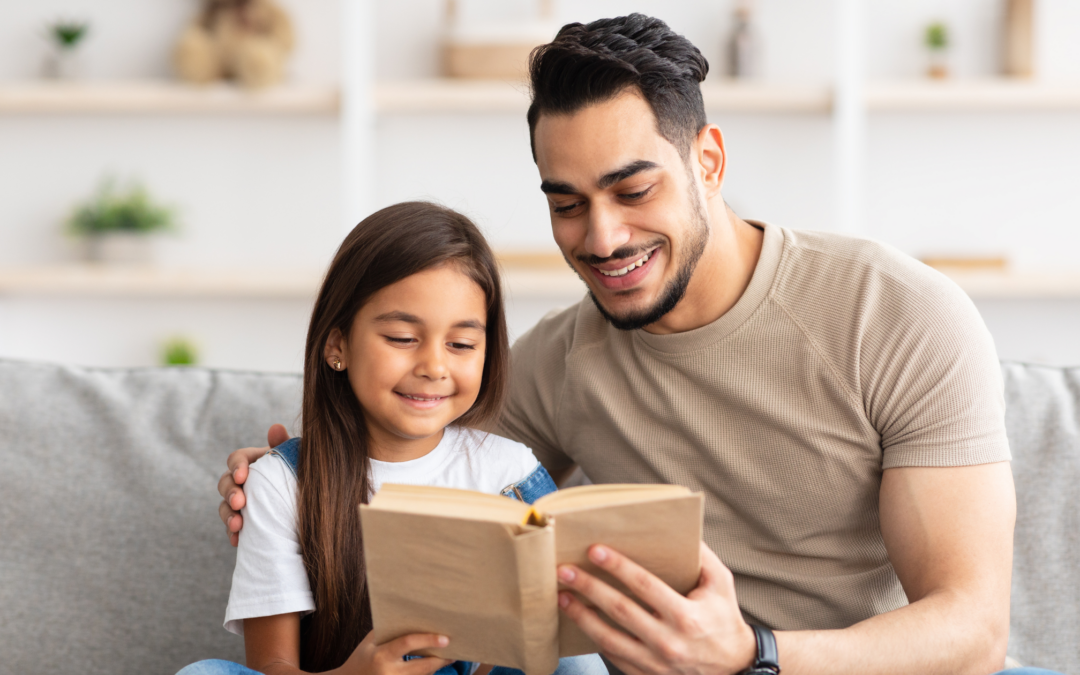Why Dads Should Read to Their Children
A while back, our Homeschool Connections co-founder Maureen Wittmann did an interview with Lisa Mladnich on the Homeschooling Saints podcast about the power of reading aloud to your children. It was an engaging and edifying discussion that tackled the subject of read-alouds from many different perspectives. I highly recommend you give it a listen!
One thing Maureen mentioned in the talk was the specific importance of fathers reading to their children and the special benefits associated with this activity. In today’s post, I will expand on this subject and discuss the reasons why it is so important for dads to read aloud to their children.
The Research
Psychologists have long understood the power of reading aloud to children. But in 2015, Dr. Elisabeth Duursma of Harvard conducted a study to discover if it made a difference if the father, in particular, was the one doing the read-aloud. Dr. Duursma found that father-led read-alouds had a major impact on children’s language development, especially between the ages of two and five. Duursma found that a mother’s reading did not have the same level of impact.
What made the father’s reading unique? Dr. Duursma said that fathers engage with written material differently than mothers:
It was quite interesting that they [fathers] have very different ways of interacting around the book. Mums are what I call kind of ‘teachers’—they ask a lot of questions about the book, objects in the book, labelling…How many apples are there? What are the colours of this animal? What sound does he make?
Dads use far more abstract language, which we know is really good for children’s vocabulary development. For example, in one of the books they talked about a ladder and lots of the dads said: ‘Oh, remember that time that I used a ladder to paint the house (or for work)?’ Or even little things, in one of the books they talked about a spider and one of the dads said: ‘Remember that spider we had in the bathroom? Daddy was a little afraid and had to call mummy to get the spider’. Mums didn’t do any of that. (source)
Dr. Duursma went on to explain that fathers generally employed more strategies in how they approached the reading, which in turn led to a more engaging experience for the child. In other words, mothers teach the story, but fathers are more likely to enact it, with things like voices and sound effects:
I think one of the reasons is, probably, dads are not used to reading very often, so they use a lot of different techniques to engage the child and one of them is probably relating things to the child’s own life. But, on the other hand, they used a lot of very different language, more abstract, more challenging to children – so I think that might be one of the reasons why it had such a big impact on children’s language and cognitive development. It was really challenging for them [the children] to read with their fathers. (ibid)
I recommend you read Dr. Duursma’s full report, which you can find online here. Just to be clear, she does not suggest that a mother’s reading has no impact. Rather, she suggests the father’s reading has a different kind of impact. Duursma actually believes mother and father-led read-alouds are complimentary. The mother’s reading lays the groundwork for fundamental comprehension, while a father’s reading acts as a “booster” for language development. Ideally, both parents should read aloud, which provides a cumulative benefit of more book reading by both parents in the child’s life.
The Benefits of Dads Doing Read-Alouds
So, what are some of the specific benefits associated with fathers reading aloud to their children? There are quite a few. However, please keep in mind these benefits are all most pronounced between the ages of two and five when a child is developing his or her communication skills:
- Children read better, have more advanced vocabularies, language comprehension, and communication skills, and are more prepared to begin school than children with fathers who are less involved in family reading.
- The more “interactive” nature of a father’s reading techniques holds the child’s attention better through gaze, gestures, voices, etc., which facilitates learning.
- Another study found that fathers boost their children’s expressiveness and language development by reading regularly to their children for just 20 minutes a day. This is believed to be because fathers tend to “use bigger words and longer sentences, speaking in less rhythmic sequences than mothers, perhaps trying not to baby the child” (source).
- The same study found that children whose fathers read to them advanced in reading levels more quickly.
- Other positive correlations have been noticed, such as increased self-esteem, less likelihood of depression later in life, relaxation, and overall improvement in mental health.
I would also add that any read-aloud by mom or dad will be enjoyable for children and build family bonds. Children who were read aloud to by their parents regularly come to treasure these experiences as some of their happiest childhood memories. Given this and all the other benefits we’ve discussed, what’s holding you back? Go grab a book, snuggle your kids, brush up on your voices, and dive in!
Lastly, if you’re looking for good picture books to read aloud, check out Christian Ohnimus’s new website, Dad Reads Aloud.






